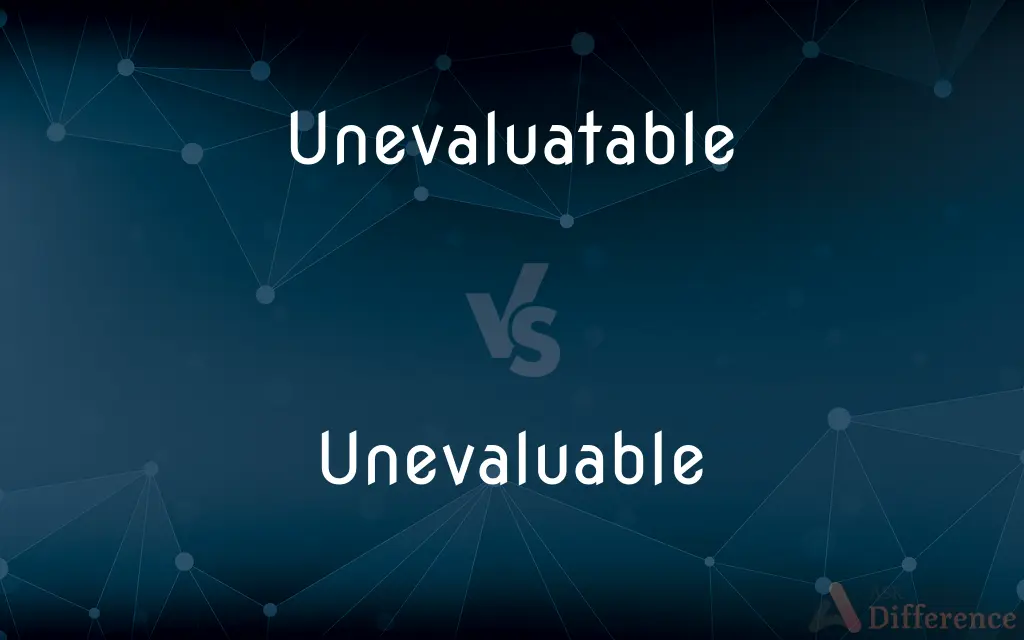Unevaluatable vs. Unevaluable — What's the Difference?
By Fiza Rafique & Urooj Arif — Updated on April 27, 2024
Unevaluatable often refers to things that cannot be assessed due to complexity or lack of information, while unevaluable implies that something lacks the qualities or characteristics to be evaluated at all.

Difference Between Unevaluatable and Unevaluable
Table of Contents
ADVERTISEMENT
Key Differences
Unevaluatable is typically used when an item or situation is too complex, ambiguous, or variable to assess accurately. For instance, abstract concepts or highly subjective matters may be deemed unevaluatable. Whereas, unevaluable describes items or situations that fundamentally cannot be evaluated because they do not meet the necessary criteria or standards for assessment. This term is less about complexity and more about the absence of measurable attributes.
Unevaluatable may apply to scenarios where traditional metrics or methods fail to provide a meaningful assessment, such as evaluating an artist’s impact on culture. On the other hand, unevaluable might be used to describe something like beauty, where the inherent subjectivity precludes a standard evaluation.
In some contexts, unevaluatable is used to express the temporary inability to evaluate due to missing data or an evolving situation. Meanwhile, unevaluable suggests a permanent state where evaluation is not just currently impossible but fundamentally inappropriate or unfeasible.
In the field of research, a hypothesis could be considered unevaluatable if it cannot be tested with existing scientific methods or technologies. Conversely, a hypothesis might be unevaluable if it does not formulate a testable prediction at all, thus lacking one of the basic criteria for scientific inquiry.
While both terms share a root in evaluation, they diverge in their application based on the reasons behind why an evaluation cannot be conducted. Unevaluatable often leaves room for future possibility of evaluation, assuming changes in circumstances or advancements in methodology. In contrast, something described as unevaluable typically suggests a more definitive impossibility of assessment.
ADVERTISEMENT
Comparison Chart
Definition
Not capable of being evaluated due to complexity or limits in assessment methods
Lacks essential attributes that make evaluation possible
Context of Use
Complex systems, abstract concepts, subjective assessments
Inherently unmeasurable qualities, permanent evaluation impossibility
Temporality
Potentially temporary; may be evaluable in the future
Often permanent; inherently not evaluable
Dependency on Conditions
Dependent on available tools, methods, or data
Independent of external conditions
Typical Examples
Scientific theories at the edge of current understanding, artistic influence
Personal preferences, abstract qualities like beauty
Compare with Definitions
Unevaluatable
Not assessable using current methodologies.
The film’s cultural impact is unevaluatable at this stage.
Unevaluable
Permanently outside evaluation capabilities.
Individual happiness is unevaluable by external standards.
Unevaluatable
Temporarily beyond evaluation scope.
The long-term effects of the policy are currently unevaluatable.
Unevaluable
Lacking necessary qualities for evaluation.
True love is often felt to be unevaluable.
Unevaluatable
Applied to abstract, highly subjective topics.
Personal ethics are often considered unevaluatable.
Unevaluable
Implies a definitive lack of measurable standards.
The beauty of a sunset is typically unevaluable.
Unevaluatable
Incapable of being evaluated due to complexity.
The unevaluatable nature of quantum mechanics often puzzles even the experts.
Unevaluable
Fundamentally unassessable.
The spiritual worth of a pilgrimage is unevaluable.
Unevaluatable
Dependent on unavailable data.
Without further information, the theory remains unevaluatable.
Unevaluable
Inherently subjective and individual.
Personal taste in music is unevaluable.
Unevaluatable
Not able to be evaluated.
Unevaluable
Not evaluable.
Common Curiosities
Can something unevaluable become evaluatable?
Typically no, as unevaluable implies a fundamental lack of evaluative qualities.
Are personal feelings unevaluatable or unevaluable?
Personal feelings are often unevaluatable due to their subjective nature and complexity.
What makes something unevaluatable?
Complexity, lack of information, or the limits of current evaluation methods can make something unevaluatable.
How do researchers handle unevaluatable hypotheses?
They may seek to refine or adjust the hypotheses to make them testable, or wait for advancements in methodology.
Can use of unevaluatable and unevaluable overlap?
Yes, in some contexts they can overlap, especially when discussing abstract or subjective matters.
Is the success of a novel unevaluatable or unevaluable?
The success can be unevaluatable in terms of predicting its cultural impact but not in sales figures.
What is an example of something unevaluable?
The essence of artistic expression can be unevaluable as it does not conform to standard criteria for evaluation.
How does the scientific community view unevaluable theories?
They are often dismissed or ignored until they can be formulated in a testable, evaluatable manner.
Can moral values be evaluated?
Moral values are generally considered unevaluatable due to their subjective and cultural variability.
What might change an unevaluatable condition to an evaluatable one?
Advances in technology, methodologies, or obtaining new data can change an unevaluatable condition.
What is a real-world example of an unevaluatable situation?
The exact influence of historical figures on modern society can be unevaluatable due to the multitude of influencing factors.
Is beauty considered unevaluatable or unevaluable?
Beauty is often considered unevaluable due to its inherent subjectivity and personal variance.
Are economic forecasts unevaluatable or unevaluable?
Economic forecasts are typically unevaluatable due to the complexities and variables involved.
Can a person’s worth be evaluated?
A person's worth is often seen as unevaluable, reflecting a respect for individual intrinsic value beyond metrics.
What distinguishes unevaluatable from impossible?
Unevaluatable refers to assessment difficulties, whereas impossible is broader, often denoting inability to occur or exist.
Share Your Discovery

Previous Comparison
Drawing vs. Plan
Next Comparison
Peace vs. TranquilityAuthor Spotlight
Written by
Fiza RafiqueFiza Rafique is a skilled content writer at AskDifference.com, where she meticulously refines and enhances written pieces. Drawing from her vast editorial expertise, Fiza ensures clarity, accuracy, and precision in every article. Passionate about language, she continually seeks to elevate the quality of content for readers worldwide.
Co-written by
Urooj ArifUrooj is a skilled content writer at Ask Difference, known for her exceptional ability to simplify complex topics into engaging and informative content. With a passion for research and a flair for clear, concise writing, she consistently delivers articles that resonate with our diverse audience.












































